- Home
- Vince Flynn
Mitch Rapp 05 - Memorial Day Page 27
Mitch Rapp 05 - Memorial Day Read online
Page 27
Stealey chose to ignore the jab.
Rapp wasn’t inclined to quit just yet. “What information have you gotten out of the two men in jail?”
Stealey looked at him as if she had tired of this line of questioning and was just barely able to conceal her impatience. “Mr. Rapp, this is a domestic issue that is already in front of the courts.”
“And your point is…”
“The two suspects in question have a lawyer,” she said now with a healthy dose of irritation in her voice. “Surely you are not suggesting torture as a method to get these men to talk?”
“I don’t give a shit what you use to get them to talk. Just get them talking, and do it fast.”
Stealey’s face flushed, but her piercing eyes never left Rapp’s. “This is entirely ludicrous.”
Rapp was beyond the point of caring. “I’ll tell you what’s ludicrous. Mustafa al-Yamani, one of al-Qaeda’s top lieutenants, is in America right now, and I’ll guarantee you the two men you have in custody have information that could help us capture him.”
“Mr. Rapp, the Justice Department doesn’t tell you how to conduct your business outside this country, so I suggest you return the favor and let us handle things here in America.”
“Actually you do try to tell me how to do my job. I just choose to ignore you.”
“Well, I guess we’ll just have to do the same.”
“How do you know they don’t have another bomb? How do you know they don’t have another attack planned? We can’t take the chance. Those men you have in jail need to be interrogated, and don’t tell me you can’t find a federal judge to revoke their citizenship, because if you can’t, I can think of one that’ll have it all taken care of in thirty minutes.”
“And we’ll have a media nightmare on our hands,” growled Valerie Jones. “I am fed up with these outbursts.” She looked to Rapp’s boss. “If you can’t control him, don’t bring him to these meetings anymore.”
Rapp stood up so fast his chair toppled over. He slammed his left hand down flat on the table. “Outbursts,” he shouted at Jones. “These two pricks were planning on wiping Washington, D.C., off the map! I think the American people might cut us a little slack if we decide to deny them their day in court!”
“That’s it.” The president stood and pointed at Rapp and then Kennedy. “My office! Right now!”
Rapp marched down the hall and seriously considered walking right out the door and never looking back. People who didn’t share his commitment were one thing, but actually getting in his way was another. Before he could decide, Kennedy caught up.
“You said what needed to be said.”
Rapp shook his head and kept moving. “I’m getting sick of this bullshit, Irene.”
“I know you are, but hang in there.” In a quieter voice she added, “He needs to hear you. Don’t back down.”
Surprised, Rapp turned his head and stared at her. Kennedy usually told him to keep his mouth shut. They turned into the Oval Office and a moment later were joined by the president and Jones. The four of them faced one another in front of the president’s desk.
Jones started to speak and the president held up his hand and stopped her cold. It was obvious he was trying to remain calm. “This is the White House. I need levelheaded advisors, and I will tolerate nothing less.”
Rapp was beyond caring. He was incensed at the lunacy of such decisions in the face of something so serious. “Levelheaded,” he repeated. “Okay, how about this for a levelheaded assessment?” He took in a deep breath and then in a very calm voice said, “The next time a group of Islamic radical fundamentalists try to blow up Washington, D.C., you might want to consult your entire national security team, including the director of the CIA, and place a little less emphasis on the advice you receive from your attorney general, who by the way is looking to make a name for himself so he can be your running mate in the upcoming election.”
Hayes’s fair complexion had grown flushed. “You are on thin ice, Mister.”
“Oh…I forgot one other thing. You should also place a little less emphasis on what your chief of staff tells you since she doesn’t have the slightest idea what she’s talking about when it comes to terrorism.”
Hayes’s face was now beet red. “Mitch, I have a lot of respect for you, but I’m getting sick and tired of you walking around here like you’re the only person who cares…the only person who’s contributed.”
Rapp’s anger reached a steady boil. Barely able to conceal his fury he kept his eyes locked on the president and said, “The next time you compare the contributions I’ve made in the fight against terrorism to that of your political appointees, you won’t have to worry about firing me.”
“Everybody contributes in their own way. Just because they aren’t out in the field doesn’t mean they aren’t as committed to the war on terror just as much as you.” Hayes pointed his finger at Rapp. “You need to start respecting other people’s opinions, and realize you’re not the only one with the answers.”
Rapp didn’t wonder for even a second if he was in the wrong. He had his faults, and he was more than aware of them, but what he had just heard from the president was absolute unadulterated bullshit. “Mr. President, you sit here in this vacuum with all of these sycophants and so-called experts running around advising you, but have you stopped to realize that you came within a whisker of being incinerated by a nuclear bomb?”
“Of course I have.”
“Mr. President, there are a lot of things that I don’t tell you about. Stuff that you’re better off not knowing, but maybe now’s a good time to give you a glimpse into what it takes to win this war. Do you have any idea how we found out that the nuclear material was on the ship headed for Charleston?”
Hayes shook his head.
“We pulled five prisoners out of that village in Pakistan, sir, and none of them were willing to talk. I lined them all up, and started with a man named Ali Saed al-Houri. I put a gun to his head, and when he refused to answer my questions I blew his brains out, Mr. President. I executed the bastard, and I didn’t feel an ounce of shame or guilt. I thought of the innocent men and women who were forced to jump out of the burning World Trade Center, and I pulled the trigger. I moved on to the next terrorist and blew his brains out too, and then the third guy in line started singing like a bird. That’s how we found out about the bomb, sir. That’s what it takes to win this war on terror. So don’t lecture me about commitment because I doubt anyone else on your national security staff would have pulled that trigger, and don’t ever forget that if I hadn’t, we wouldn’t even have the luxury of this argument. That is for certain.”
ATLANTA
It was midmorning by the time they reached the construction site. Al-Yamani drove past the entrance twice before turning in. He even stopped once and scanned the sky to make sure there were no helicopters following him. He had very bad memories when it came to helicopters. They reminded him of the early years in Afghanistan when the Soviets had dominated the battlefield with their lethal flying machines. Al-Yamani loved the bitter irony that it was the Americans with their shoulder-launched Stinger missiles who had helped them to beat the godless communists. To al-Yamani it was further proof that Allah was on their side.
When they pulled into the clearing, the sun was already peeking over the tops of the easternmost stand of tall Georgia pines. Al-Yamani got out of the car wearing a cheap pair of sunglasses that he had bought to help shield his increasingly sensitive eyes.
Two men came out of the construction trailer with broad grins on their faces.
Al-Yamani took this as a good sign. He quietly embraced each of them, relieved beyond measure that they had made it. He pointed to the trailer and all four of them went inside where they could talk more freely.
“Imtaz,” al-Yamani said, as he took off his sunglasses. “This is Khaled and Hasan.”
The three men exchanged greetings. Al-Yamani had thought of his two old friends often since he last saw t
hem in Cuba almost a week ago. He was relieved that they had avoided detection by the Americans.
“Have our shipments arrived?” al-Yamani asked.
Hasan, the taller and older of the two men, answered. “Yes, the main component arrived yesterday.”
“Take me to it. I wish to see it.”
All four men went outside. Hasan led them to the back of a pickup truck and lowered the tailgate. A wooden crate approximately three feet square sat in the middle of the coated bed. Hasan climbed up and offered a hand to his weakened friend. He then pried the top off the crate with a crowbar and unpacked a balled-up canvas tarp. The two men stood there for a moment looking at the object of destruction that they had worked so hard to acquire. Basking in the warm sun they looked up at one another and shared a smile. They were about to do something great.
Zubair, standing on the ground below them, was like a child trying to see what the grownups were looking at. His contribution to the project had been to design the fire sets and help shape the explosive charges. For security reasons he had been kept at a separate location from the nuclear material, and had yet to lay eyes on it. Unable to hold back any longer he climbed up into the truck bed and looked into the crate.
What he saw horrified him. Zubair had expected to see a shiny, stable core of nuclear material in a properly shielded case, but was instead greeted with the sight of a corroded hunk of metal the size of a basketball. His eyes opened wide with fear, and he jumped from the back of the truck, almost spraining his ankle in the process.
Zubair scurried to his feet and ran back toward the construction trailer, leaving the other three men staring after him in surprise. “You need to get away from that object right now.” Without the proper equipment, Zubair had no idea just how hot the nuclear material was, but he guessed it was extremely dangerous.
Al-Yamani glared at the cowardly Pakistani. He was just like the other three. The Saudi had recruited all of the scientists and killed each of them as soon as he had completed his task. He had hoped this one would show a little more bravery in the face of such magnificence, but it appeared he was as weak as the others.
“What are you so afraid of?”
“That is extremely unstable material, and it isn’t even shielded. How did you get it into the country?”
Khaled, who was standing between the scientist and the pickup, pointed to the trailer that the semi truck had delivered yesterday. “We hid it in a shipment of granite.”
Zubair spun around and looked at the truck. Of course. Not only would granite shield the device, but it emitted natural radiation that would confuse any sensors. He looked back at al-Yamani and said, “I’m not joking. You need to get down right now.”
“Stop overreacting. It cannot do any more harm to me than has already been done.”
“Oh yes it can. If you stand up there much longer you’ll be dead before the sun sets.”
Al-Yamani looked down into the box and decided to hear the scientist out. He climbed down from the truck and Hasan followed.
“Explain to me your fears.”
“That has no shielding and it is showing signs of severe deterioration. Anything other than brief exposure could be fatal.”
“I am already dying.”
“But that will hasten your radiation poisoning. In order for us to transport and assemble the weapon it must be properly shielded or it will kill us all.”
“How quickly?” asked al-Yamani. All he cared was that they made it to their target.
“Most likely before we reach Washington.”
Al-Yamani frowned. “So what do you propose we do?”
“As I said, we need to shield it properly.”
“Is that difficult?”
“Not with the right material…either lead or depleted uranium will do.”
“How long will it take?” Al-Yamani had some extra time built into the schedule but not much.
Zubair thought about it for a minute and said, “A couple of hours.”
“Do we have an alternative?”
“Not if you want to take it all the way to Washington.”
There was a backup plan to detonate the device in Atlanta, but al-Yamani was not willing to settle for that. Especially after listening to the president this morning.
WASHINGTON, D.C.
It was standing-room-only in the bar at Smith and Wollensky’s and every table in the restaurant was occupied. Pat Holmes sat at his usual corner table with his back to the wall looking out onto as much of the restaurant as possible. As chairman of the Democratic Party he needed to see and be seen. On a normal night, a half dozen people would have already stopped by to shake hands and say hello, but not this night.
Holmes had a pretty good idea why, and it involved one of the two women at his table. Valerie Jones had the unique ability to repel people by her mere presence. She was, to put it bluntly, a ballbuster of the first order. Jones had religion when it came to her beloved Democratic Party. So thorough was her commitment that there wasn’t a Republican who she liked, and she made no effort to hide her feelings. She even despised independents for their spineless inability to pick sides. Her behavior toward the so-called enemy was more characteristic of a fanatical campaign volunteer than a senior White House official. Her pugnacious reputation caused the more civilized players in town to steer clear of her.
Truth be told, when the cameras weren’t around, and if it wasn’t election season, the vast majority of Democrats and Republicans got along, and in most cases actually liked each other. Holmes fell into that majority. When he had to, he could get out in front of the camera and accuse the Republicans of outlandish selfishness and incompetence, and then go play a round of golf later the same day with his Republican counterpart.
Sometimes he wondered if the president’s chief of staff even noticed that she was so disliked by reasonable people. He doubted it. Jones was a very focused person, who had great organizational skills and uncanny political smarts, but who was severely challenged in the people skills department. At the end of the day, though, he supposed every administration needed someone like Jones—a pit bull to keep people in line.
Peggy Stealey was an entirely different story. She had that star quality about her. She had classy good looks; she was smart as hell; she was cunning, and he guessed very dangerous to be on the wrong side of. He wanted to get her into bed in the worst way, but he’d experienced enough dickteases over the years to know the best way to do that was to make her chase him.
The waiter approached, and before he got too close, Holmes gestured for another bottle of Silver Oak. Given the delicate nature of their current conversation, he didn’t want anyone coming within ten feet of the table.
“I have no objection to anything I’ve heard.” Holmes leaned in a bit closer and lowered his voice. “I think it will energize the party.”
“I agree,” said Jones, as she attacked her steak with a knife.
“Vice President Baxter is a dud,” Holmes continued. “Stokes is younger, he’s better looking, and he’s got a pretty wife. He’s a little light on experience, but all in all I think he’d be a nice addition to the ticket.”
Stealey was about to take a bite of her Chilean sea bass when her fork stopped inches from her lips. “His wife isn’t pretty.”
“Sure she is.” Holmes grabbed his glass of wine. “She’s very attractive.”
The sea bass was now in her mouth so Stealey just shook her head forcefully.
Holmes took a swig of wine. “Unless you’re a lesbian, Peggy, I think I’m in a better position to judge this one. She’s a good-looking woman…trust me.”
Even though she wanted to argue with him, she knew it was unwise to let her hatred of her boss’s wife be known. “Just a difference of opinion…that’s all.” She took a sip of water and then stabbed a green bean with her fork. “So we have a deal.”
Holmes looked at Jones and wondered if they’d bothered to include the president in any of these discussions. “Robert’s on bo
ard with this?”
“Absolutely. You know he hates the little weasel.”
“All right, I know they’re a bad fit, but I want to hear it from him personally.”
“Why?” Jones took a sip of wine. “You don’t trust me?”
“I trust you…I just want to make sure he’s thought this all the way through. It isn’t every day the president bounces his vice president off the ticket.”
“It’s been done before,” Jones replied airily, trying to stress that it was no big deal.
Holmes knew it had, but it had to be done right. “I said I think it’s a good idea. It just needs to be handled right. The last thing we need is Baxter airing our dirty laundry during the middle of a campaign because he feels we gave him the shaft.”
“We are giving him the shaft,” said Stealey. “And I don’t see how he’ll view it any other way.”
“The party is bigger than any one person,” said Jones. “He’ll understand that, and if he doesn’t, we’ll just have to make it clear that if he decides to go crying to the press we’ll bury him.”
“You’re absolutely right,” said Holmes. “We play to his party loyalty, and if he doesn’t get on board we’ll let it be known that things could get really tough. It’s absolutely crucial, though, that we get him to go quietly.”
Holmes reminded Jones of something and she pointed her fork at him. “Do you know who else needs to go?”
“Who.”
“Mitch Rapp. That’s who.”
Holmes almost choked on the piece of New York strip that he was trying to chew. When he’d chased it with a gulp of red wine he said, “What are you talking about?”
“You know who Mitch Rapp is…don’t you?”
“Of course I do. He’s a walking legend, and he’s married to that beautiful NBC reporter Anna Rielly.”
“Have you ever met him?”
“No, but what’s your point? Why in the world would the president want to get rid of him?”
“The man is a ticking bomb,” answered Jones. “Sooner or later he’s going to embarrass this administration, and I don’t mean some little scandal…I’m talking full-blown Congressional investigation…people being fired and people ending up in jail.”

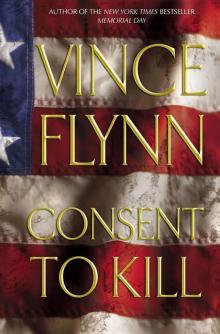 Consent to Kill
Consent to Kill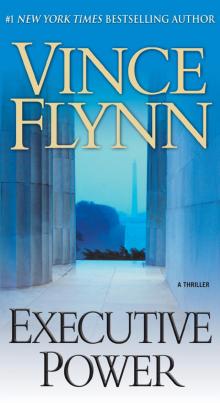 Executive Power
Executive Power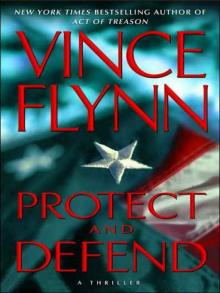 Protect and Defend
Protect and Defend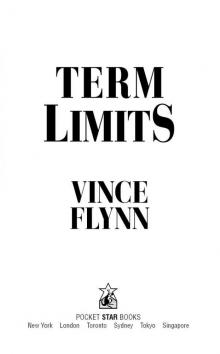 Term Limits
Term Limits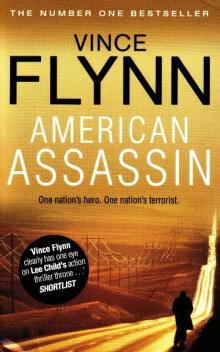 American Assassin
American Assassin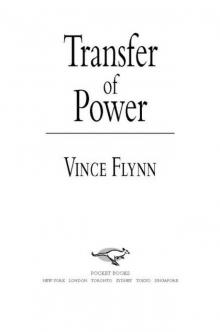 Transfer of Power
Transfer of Power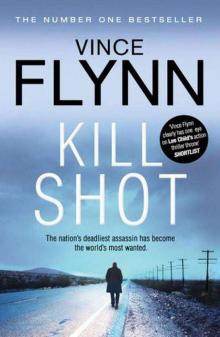 Kill Shot
Kill Shot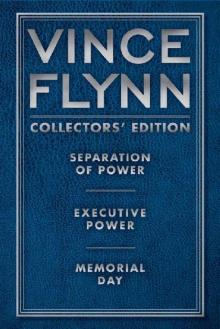 Vince Flynn Collectors' Edition 2
Vince Flynn Collectors' Edition 2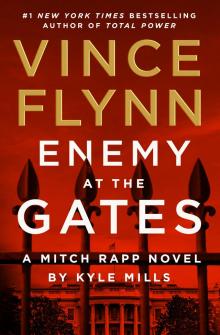 Enemy at the Gates
Enemy at the Gates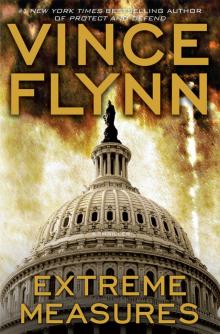 Extreme Measures
Extreme Measures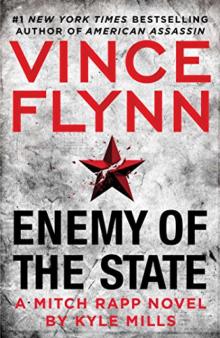 Enemy of the State
Enemy of the State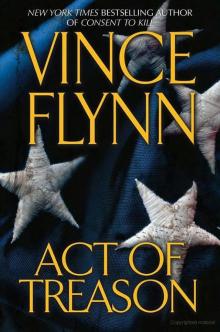 Act of Treason
Act of Treason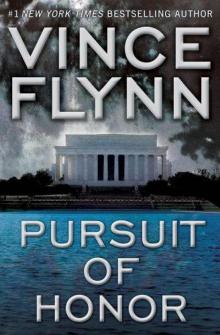 Pursuit of Honor
Pursuit of Honor The Survivor
The Survivor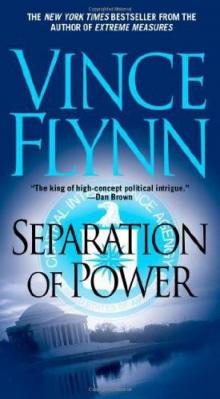 Separation of Power
Separation of Power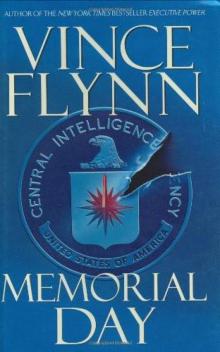 Memorial Day
Memorial Day The Last Man
The Last Man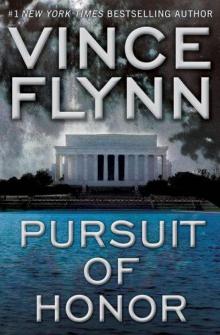 Pursuit of Honor_A Thriller
Pursuit of Honor_A Thriller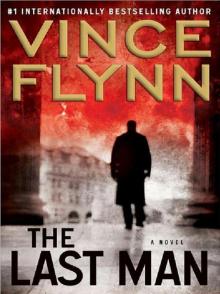 Mitch Rapp 13 - The Last Man
Mitch Rapp 13 - The Last Man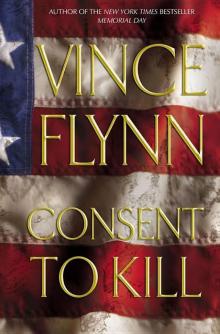 Consent to Kill:
Consent to Kill: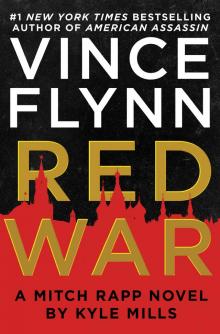 Red War
Red War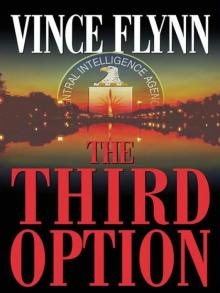 Mitch Rapp 02 - The Third Option
Mitch Rapp 02 - The Third Option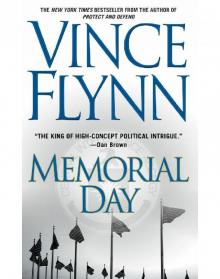 Mitch Rapp 05 - Memorial Day
Mitch Rapp 05 - Memorial Day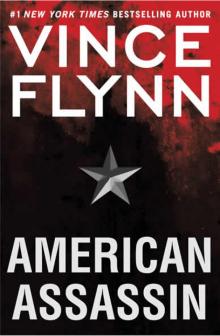 Mitch Rapp 11 - American Assassin
Mitch Rapp 11 - American Assassin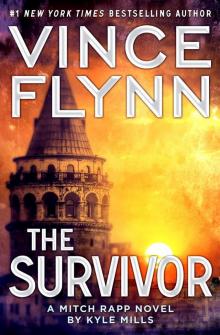 Mitch Rapp 14 - The Survivor
Mitch Rapp 14 - The Survivor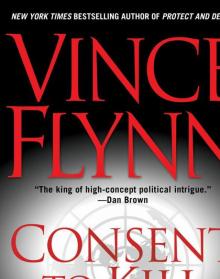 Mitch Rapp 06 - Consent to Kill
Mitch Rapp 06 - Consent to Kill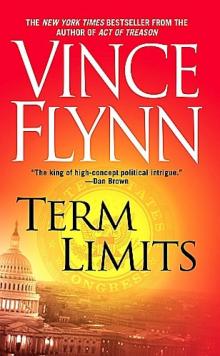 Term Limits mr-1
Term Limits mr-1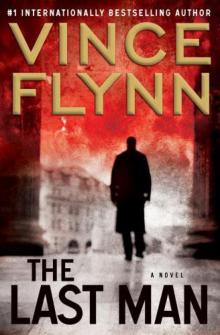 The Last Man mr-13
The Last Man mr-13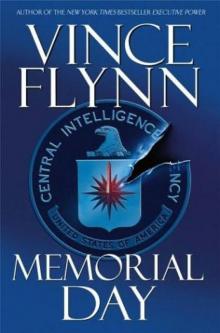 Memorial Day mr-5
Memorial Day mr-5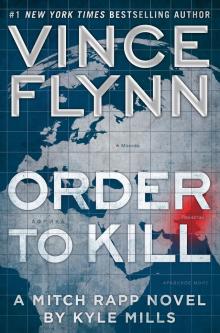 Order to Kill
Order to Kill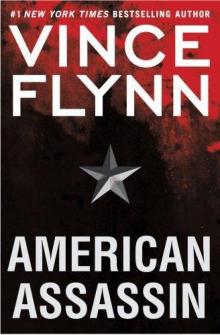 American Assassin: A Thriller
American Assassin: A Thriller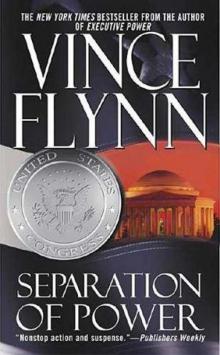 Separation of Power mr-3
Separation of Power mr-3